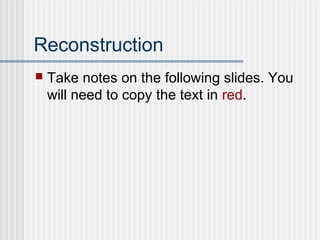
Reconstruction
- 1. Reconstruction Take notes on the following slides. You will need to copy the text in red.
- 2. The South is destroyed The Civil War ended April 9, 1865. Most of the land in the South was destroyed by the Civil War. The South would need to be rebuilt. This rebuilding of the South was called Reconstruction.
- 3. Reconstruction Plan President Lincoln wanted to reunite the nation as quickly as possible. Any southern state with at least 10% of its voters making a pledge to be loyal to the U.S. could be readmitted to the Union. The South also had to accept a ban on slavery.
- 5. The Slaves Are Free With the ending of the war, the slaves were now free. The 13th Amendment to the Constitution was passed. The 13th Amendment made slavery illegal forever in the United States.
- 6. The Freedmen’s Bureau The Freedmen’s Bureau was established to help poor blacks and whites in the South. The Freedmen’s Bureau established schools in the South. Laws against educating slaves during the Civil War meant that most ex-slaves did not know how to read and write.
- 7. Lincoln’s Second Inaugural Address On March 4, 1865, President Lincoln laid out his approach to Reconstruction in his second inaugural address. He hoped to reunite the nation and it’s people.
- 8. “With malice [hatred] toward none, with charity for all, with firmness in the right as God gives us to see the right, let us finish the work we are in, to bind up the nation's wounds, to care for him who shall have borne the battle, and for his widow and for his orphans, to do all which may achieve and cherish a just and a lasting peace among ourselves and with all nations.
- 9. Lincoln is assassinated Just six days after the war ended, on April 15, 1865, President Abraham Lincoln was assassinated while watching a play. Lincoln was assassinated by John Wilkes Booth, a Southerner who was angry at Lincoln. Vice-President Andrew Johnson became president.
- 11. The Black Codes The Black Codes were laws passed by Southern states that limited the newfound freedom of African Americans. Black Codes forced African Americans to work on farms or as servants. They also prevented African Americans from owning guns, holding public meetings, or renting property in cities.
- 12. Voting Rights Other laws were passed to keep blacks from voting. One law said former slaves had to pay a tax to vote. It was called a poll tax. Another law was passed that said a person could only vote if their grandfather had voted. These laws were called the Grandfather Clause.
- 14. Radical Republicans The Black Codes angered many Republicans in Congress who felt the South was returning to its old ways. The Radical Republicans wanted the South to change more before they could be readmitted to the Union. They were angry at President Johnson for letting the South off so easy.
- 15. The 14th Amendment The 14th Amendment guaranteed citizenship to all people born or naturalized within the U.S. except for the Indians. It said that state governments could not “deprive any person of life, liberty, or property, without due process of law.”
- 16. Johnson and The Radical Republicans Congress was angry at President Johnson for not going along with their Reconstruction policies. As a result, Congress impeached Johnson.
- 17. Impeachment Impeachment is the process of charging a public official with a crime. The next step was to try the president in the Senate. By a single vote, Republicans failed to convict Johnson. The only other time a president has been impeached was Bill Clinton.
- 18. Ku Klux Klan In 1866 a group of white southerners created the Ku Klux Klan. The KKK was a secret society opposed to African Americans obtaining civil rights, particularly the right to vote. The KKK used violence and intimidation to frighten blacks. Klan members wore white robes and hoods to hide their identities. The Klan was known to have murdered many people.
- 20. 15th Amendment In 1870 the 15th Amendment became law. The 15th Amendment gave African American men the right to vote. Women’s rights activists were angry because the amendment did not also grant women the right to vote.
- 21. Segregation and Jim Crow Laws Starting in 1881, blacks had to stay in separate hotels, sit in separate parts of theaters, ride in separate rail cars, and have separate schools, libraries, and parks. This is known as segregation. Segregation - the legal separation of blacks and whites in public places Jim Crow Laws - laws that forced segregation
- 22. Plessy v. Ferguson The Supreme Court ruled segregation was legal in Plessy v. Ferguson. They said that segregation was fair as long as “separate-but-equal” facilities were provided for African Americans. In practice, the African American facilities were usually “separate-and-unequal.” It would take until the 1965, 100 years after the Civil War ended, for Jim Crow laws to be outlawed and blacks to finally realize legal equality in America.
- 23. 40 Acres and Mule During Reconstruction, ex-slaves were promised 40 acres of land and a mule. Unfortunately, the government never came through with their promise. During the riots in the 1960’s, people were overheard saying, “That’s for my 40 acres and a mule,” as they stole something from a store. Film maker Spike Lee’s company is called 40 Acres and a Mule.